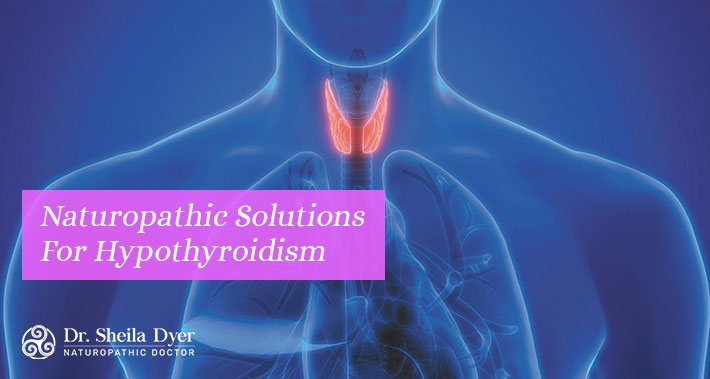Unexplained weight gain.
Joint pain.
Heart disease.
Reproductive issues.
These are just a few examples of symptoms associated with hypothyroidism.
But while it can be frightening to receive a diagnosis, there are naturopathic treatments for autoimmune conditions available that can help.
Keep reading to learn more.
What Is Your Thyroid?
Your thyroid is a butterfly-shaped gland located at the front of your neck.
It’s responsible for producing hormones.
Hormones are chemical messengers in your body.
They affect all manner of bodily functions, including breathing, heart rate, metabolism, menstrual cycles, body temperature, and more.
When your thyroid produces the too little – or too much – thyroid hormone, the consequences can be seen and felt across your body.
Today we’ll take a closer look at what happens when not enough of these important hormones are produced.
Then, we’ll discuss the ways we can work to put things back in balance, naturally.
What Is Hypothyroidism?
When your thyroid gland is underactive, it means it’s not producing enough hormones.
This is called hypothyroidism.
In its early stages, hypothyroidism isn’t always noticeable without testing for hormone levels.
However, if left untreated, it can cause a number of health issues.
Usually, the primary symptoms that occur are chronic fatigue and weight gain.
However, these symptoms are common in a lot of different disorders and lifestyle changes.
If you’re in the early stages of hypothyroidism, you might not even notice you have it.
Over time, more symptoms will appear as your hypothyroidism worsens.
Some of the symptoms you experience might include:
- Constipation
- Dry skin
- Sensitivity to the cold
- Irregular menstrual cycle
- Hoarseness
- Depression
- Sleep disturbances
- Goiter
The Most Common Cause: Hashimoto’s Thyroiditis
Hashimoto’s thyroiditis, also known as Hashimoto’s disease, is an autoimmune condition.
If you have an autoimmune disease, it means that your body’s immune system is attacking healthy cells in your body and destroying them.
In the case of Hashimoto’s, your immune system attacks your thyroid gland.
This attack results in inflammation which leads to an underactive thyroid gland.
The exact reasons why this happens aren’t yet fully understood.
Although Hashimoto’s disease can occur in people of any age or gender, it’s most prevalent among middle aged women.
Other Causes Of Hypothyroidism
Although Hashimoto’s thyroiditis is the most common cause of hypothyroidism, it’s not the only cause.
There are a number of other reasons your thyroid might be underactive.
A few of these reasons are as follows:
Thyroid surgery
Sometimes, people need surgery, called a thyroidectomy, to remove a large portion of your thyroid.
Of course, having your thyroid gland removed means your thyroid can’t produce as much hormones.
The most common reason for having a thyroidectomy is to remove thyroid cancer.
If this is your situation, you will need to take supplemental thyroid hormones for life.
Radiation therapy
Cancer treatments used for cancers of the head and neck can affect your thyroid gland.
Since your thyroid gland is in your lower neck, it can’t really be avoided when you have cancer treatments for these areas.
Radiation treatment can cause damage to your thyroid gland.
Just like with surgery, this results in it producing fewer thyroid hormones.
Response to hyperthyroid treatment
Hyperthyroidism is the reverse of hypothyroidism.
It happens when your thyroid is overactive and produces too many thyroid hormones.
If you have hyperthyroidism, you may have been put on medication to treat it.
However, this can sometimes lead to overcorrection.
If you take too much medication, it can cause your hyperthyroidism to become hypothyroidism.
If this is the case, you may need to adjust your medications so that your thyroid gland is back in balance.
Medications
A number of medications can result in hypothyroidism.
This includes overuse of hyperthyroidism, mentioned above, but it also includes:
- Amiodarone, used to treat heart arrhythmia
- Sodium nitroprusside, used to treat high blood pressure
- Sulfonylureas, used to treat type 2 diabetes
- And others
Naturopathic Solutions For Hypothyroidism
If you’re experiencing hypothyroidism, there are a number of natural treatment methods which may help.
1. Address Nutrient Deficiencies
Proper nutrition plays an important role in thyroid function.
Deficiencies in vitamin B12, zinc, and selenium can all play a role in contributing to hypothyroidism.
Vitamin B12 in particular assists in improving cellular response and boosting energy production in cells.
This can help increase your thyroid’s production of hormones.
Dietary sources of vitamin B12 include:
- Liver
- Nutritional yeast
- Many fish, including trout, salmon, tuna, and haddock
- Milk, yogurt, and cheese
- Chicken and eggs
Those on a plant based or vegan diet may need to use supplement pills in order to obtain the right amount of vitamin B12.
Zinc can also improve thyroid function.
Dietary sources of zinc include meat, shellfish, legumes, nuts, and seeds.
Selenium is essential for thyroid function.
Your thyroid actually relies on selenium more than any other organ in your body.
If you don’t have enough selenium in your diet, it can heavily impact your thyroid function.
Selenium can be found in many seafoods, including fresh water fish, eggs, and Brazil nuts.
2. Avoid Foods That Interfere with Thyroid Hormones
Some foods may inhibit your body’s ability to absorb thyroid hormones.
Moderating or eliminating these foods can help you to manage hypothyroidism.
Foods to avoid include:
- Broccoli, cauliflower, and other cruciferous vegetables (small amounts are fine)
- Foods high in fat
- Gluten
- Foods high in sugar
- Processed foods and foods high in sodium
- Excess fibre
- Coffee – avoid drinking coffee within 30 minutes of taking thyroid medication
- Alcohol
3. Supplement With Ashwagandha
Ashwagandha is a plant that has been used for centuries in traditional medicine.
Now, you can find it in pill form in the supplement aisle at your pharmacy.
Ashwagandha is a type of adaptogen.
An adaptogen assists the body to keep hormone levels in balance and respond to stress.
A 2018 study in the Journal of Alternative and Complementary Medicine showed treatment with ashwagandha improved levels of thyroid stimulating hormone significantly, when compared to the placebo group.
4. Supplement With Omega-3
Omega 3 oil is already well known for its cognitive benefits.
However, the benefits of Omega 3 extend to hypothyroidism as well.
A 2014 study in the journal Acta Physiologica Hungarica found evidence that omega 3 could protect against cognitive impairment due to hypothyroidism.
5. Supplement With Selenium
Selenium is required for the body to produce thyroid hormones.
Your thyroid also has the highest selenium content of any organ in your body.
Supplementing with selenium decreases anti thyroid antibodies.
It can also improve the structure of your thyroid gland.
Foods high in selenium include Brazil nuts, meat such as pork, beef, turkey, and chicken, cottage cheese, brown rice, and sunflower seeds.
Book Your Appointment With Dr. Sheila Dyer, ND, Today
Are you experiencing health issues you can’t explain?
Have you had a recent weight gain despite no major changes to your diet or exercise routine?
Do you think you might be experiencing hypothyroidism?
If so, I’m here to help.
Book your appointment with me, Dr. Sheila Dyer, ND, today.
If you have questions about naturopathic medicine, or would like to start with your first consultation, contact me, and let’s book an appointment.
Dr. Sheila Dyer, ND1080 Dovercourt Rd,
Toronto, ON M6H 2X8
(416) 554-5135
► https://g.page/DrSheilaDyerNd
Dr. Sheila Dyer is a Naturopathic Doctor and a practicing registered nurse offering holistic healthcare with a scientific focus

